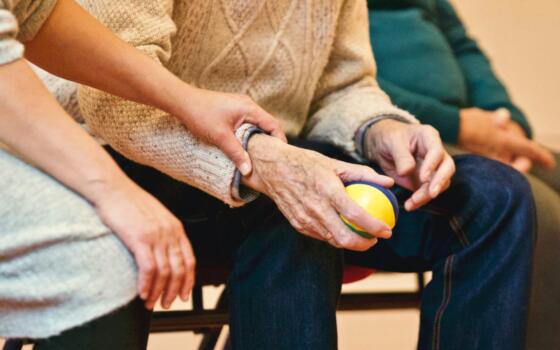We have been involved in studies to improve palliative and end of life care in care homes for over 15 years.
But even the most highly successful practice development projects in care homes are difficult to sustain because of the high turnover of staff and because of lack of sustained funding. As a result, we became aware of the need for an actual teaching/research-based care home (ToRCH) centre attached to a university or universities. Such a centre would be able not only to support other care homes across the region and help support innovation, training and research but also be a conduit through which there were closer links with regulators and policies. This is ‘new’ to the UK; although it is not new in Norway, The Netherlands, Australia and USA. By 2040, it is predicted that in Scotland more people will die at home (3O%) and in care homes (30%) with only 30% in hospital – it is therefore important to continue to sustain improvements in care homes and care-at-home.
In 2018, funding from Macmillan Cancer Relief provided the opportunity for us to develop two phases for our vision for ToRCH, namely:
- Phase 1 – the development of a local partnership of care homes that would start to undertake ‘tests of change’ which would inform the wider vision of the ToRCH centre while it was being built. Six care homes make up this “Care Home Innovation Partnership” or CHiP.
- Phase 2 – the build of the first teaching/research-based care home in the UK for SE Scotland
Phase 1 – the Care Home Innovation Partnership (CHiP)
The CHiP team (made up of managers from the six care homes + members from University of Edinburgh and Edinburgh Napier University) has helped to develop a number of different innovations in these care homes. The innovations have developed organically from within each care home as needs have prompted. Electronic care planning is now in place in four out of the six care homes. This allows care to be recorded at the time it is given on a device held by each member of the team on duty, making it more personalised and in the moment. During the first wave of Covid-19, staff in care homes that were using electronic care planning already had the devices and the ‘know-how’ to use them to their full potential developing new creative ways to communicate with families.
Another innovation that has come to the fore during Covid-19 has been the development of our original face-to-face reflective debriefing sessions. These were being done on a monthly basis to help support and encourage practice-based learning in relation to death and dying. At the beginning of the pandemic, our CHiP team were contacted for help to support care home staff with the considerable increase in deaths that they were experiencing. What started as informal support then developed into a feasibility study of ‘online’ supportive conversations and reflective sessions (OSCaRS).
As a result of this work, we have now been funded by NHS Lothian to take these OSCaRS to up to 50 care homes across Lothian.
Finally, many of the care homes are taking forward Namaste Care – a sensory programme for people with advanced dementia who can no longer speak and immobile. Instead of remaining in their own rooms they are brought to the Namaste Care room where a staff member, volunteer/s and families gather to encourage sensory experience – hand massage, togetherness, appropriate music, relaxing scents, tasty tit-bits – even story-telling etc. Families are already a major part of the community in the majority of care homes – but they have specifically found being part of Namaste Care routine extremely supportive.
Phase 2 – the Teaching/Research-based Care Home (ToRCH) Centre
In the UK, CHs are often seen, both publicly and professionally, as ‘places of last resort’ to live or work in; this perception needs to be challenged. Care homes with effective leadership, committed and supported staff, can and do provide excellent care (much of it increasingly at the end-of-life) for their residents. However, there is now an urgent workforce need to promote the care of frail older people in care homes (+ ‘care at home’) thus enthusing the younger generation to make such employment their choice.
The ToRCH Centre will consist of up to six 10-bedded ‘households’ for people requiring 24hr care + extra care apartments. Student accommodation will be part of both builds where students will live at reduced costs in return for 20hrs/month volunteering. All designs will have extensive attention to dementia-friendly engaged environments. Other amenities will encourage the Centre as a destination point for the local community i.e. restaurant/pizzeria, nursery, shop, hairdresser, exercise pool for those in the community over 70 years.
Connection to the local community is an important feature for the ToRCH Centre in order to break this idea that care homes are “islands of the old” and encourage active citizenship.
Increasingly, more older people are living ‘at home’ much long with frailty; building community is therefore very important especially in light of the increasing older population versus the working population. Not only is the vision to draw people in from the local community to the ToRCH Centre in various volunteering roles, but we anticipate a future where the ToRCH Centre, and indeed other care homes, will reach out into their local community to support people in their own homes – one such innovation is providing ‘respite’ in peoples’ own homes when family need a break rather than bringing someone in for respite into an unfamiliar environment.
Looking forward – what comes next
We are proud to announce that after many years of trying to find the right site for the ToRCH, that Queen Margaret University is keen for it to be sited on their campus. Scotland has led the way in recognising the benefits of an integrated health/social care system. In realising our vision, to deliver the ToRCH centre for excellence and community engagement, would not only demonstrate commitment to the care of older people but be the first of its kind in the UK.
Whilst we see our CHiP work changing as the ToRCH Centre gets underway, we will continue to hold care home conferences every 18-months with the different Lothian universities taking turns to organise. In May this year the conference was online and organised by Edinburgh Napier University, titled People and Practice: celebrating care home skills. The conference celebrated the amazing work done by staff in care homes during the last 18-months of the pandemic. Professor Alison Machin, Dean of Health and Social Care at Edinburgh Napier University, gave one of the opening plenaries and spoke about ToRCH, you can see this introduction below.
People and Practice: celebrating care home skills was also an opportunity to hear from those who had experienced providing relationship-based care during the pandemic. Below is a valuable excerpt from Orlagh MacMahon, a final year student in Nursing Studies at the University of Edinburgh.
“The staff were just so emotionally resilient and they just cared so much. And I think for care home staff, I think it’s the emotional labour that maybe doesn’t get recognized as much. Those sort of intrinsic skills of caring, you know, the tasks were done to an excellent ability and you could see how much of the learned stuff people were very good at, but it was those intrinsic caring skills that can’t get taught that were for me the most valuable thing that I got from, from that care home experience.” – Orlagh MacMahon, Student Nurse (University of Edinburgh)





